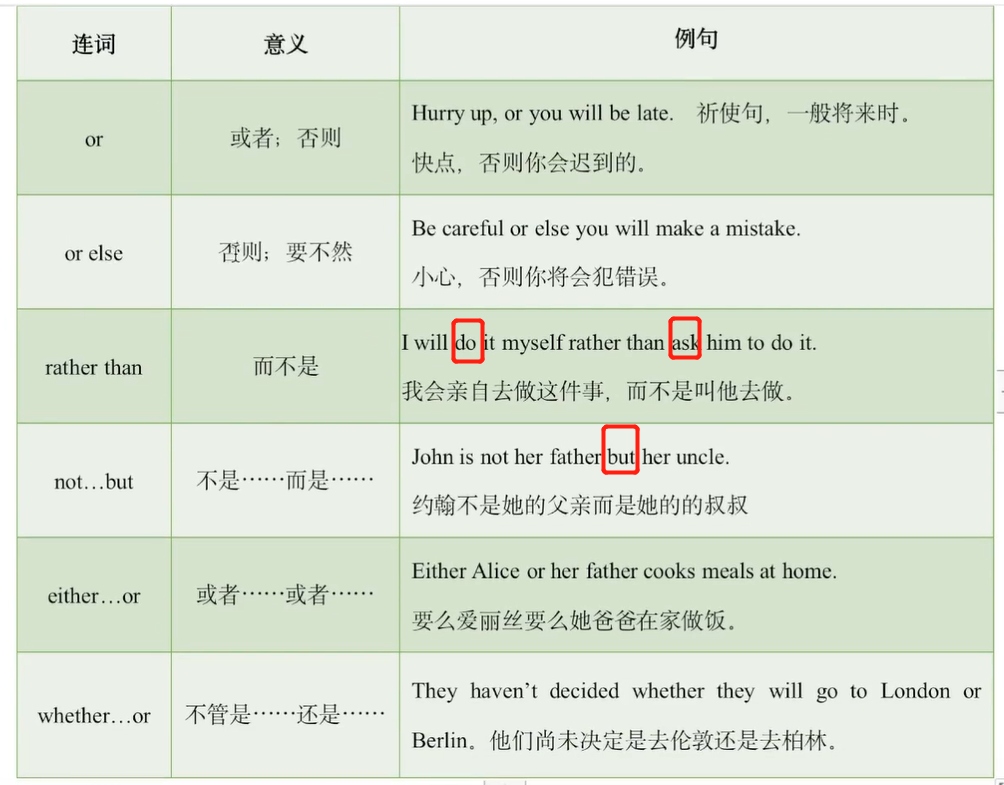按照在句子中的功能:
1.并列
and:和,又,而且
as well as :也,和
both ..and...,:既.....又......
not only ...but also....:不仅.....而且.....
neither ...nor...既不....也不
2.转折
but:前后两个事实相反
His mother won't be there, but his fatheif might
while:强调对比性的转折
I like English while he likes math
yet/and yet:前面可与and连用,且两个主语是一致
I failed again, and yet I never give up.
although 或 though 在引导让步状语从句时主句不可使用转折连词 but.但是可以使用yet 或 still
Although she is in poor health, (yet) she works hard
however 意为“然而,不过",可放在句首、句中或末,不能像 but 那样直接连接两个句子,常用逗号与句子其他部分隔开
(x)We all tried our best, however we lost the game
3.选择的并列连词
or:或者,否则
or else:否则,要不然
rather than:而不是
not...but:不是....而是....
either...or:或者...者...

4.因果

5.空格位于句首,并且后面是逗号,那么这个词性一定是否词
6.unless是一个硬条件,就是原来是处于某种状态或者动作,要改变这个,必须一个很硬的条件
7.形容词修饰复合不定代词 时,要后置
8.rice不可数名词
9.any 多用于疑问句、否定句和条件状语从句中;用于肯定句中,表示”任何
If you have any questions,please ask me.如果你有任何问题,可以问我。
10.few/little
原形 比较级 最高级
few fewer fewest
little less least
11.all/none
none:表示全部否定
all:表示全部肯定,也可以用来表示部分否定,Not all book is good;
1.all表示人时,谓语动词用复数
2.all表示事情,谓语动词用单数
12.none/no one
none:指人,指物,可以和of搭配使用.none of the books
no one:只指人,no one不能与of搭配
none 用于回答 how many 或 how much 引出的特殊疑问句,而 no one 用于答 who 引出的特殊疑问句
13.表示时间的名词前有 this,last,next,every 等修饰时,其前面不加介词
this morning,this afternoon,every day
on 用于表示某天某一天的上、下午 (指具体的某一时,一律用 on具体的某一天上午下午
on Monday 在周一
on Tuesday morning 在周二早上
在周一晚上on Monday evening
onJune6在6月6日
on time 准时
on a cold night在一个寒冷的晚上,night前有形容词修饰时,用on
in an hour 一个小时后, in a minute 一会儿,立刻, in+时间段 多久之后(经常与将来时连用)
within an hour 一个小时内
14.after:介词,连词
15.no matter what不管....,引导宾语从句或者让步状语从句
No matter what you do in the future,English will always be important.
16.in front of/in the front of
in the front of 在...前面(物体内部的前面)
in front of 早....前面,在....前面(物体外部的前面)---behind
17.above---below上方/下方
over----under正上方/正下方
18.into 进入用于表示有特定终点的运动的方向,通常用于表示动作的动词之后,如go,come,walk,run等
19.out of和into一样,也表示有一定的运动方向的,表示出来
20.enough名前,形副后,,后面也可以加to do不定式
21.across:从表面穿过
through:立体穿过
22.with one`s help
23.Nothing is +形容词比较级 than to do
Nothing is more important than to recive education 没有什么比接受教育更重要的事情了
24.hear from收到来信
25.take took taken
26. be like 强调的是内在的
look like强调的是外表
27.enjoy doing sth 喜欢做某事
28.along:介词,沿着
29.on foot步行
30.in fear of担心
31.in order to do sth为了做某事
32.be becoming aware of开始意识到
33.以ly结尾的形容词:
funny,lovely,friendly,lonely,healthy
34.alone:adj 单独的,adv:孤独地
35.recently最近,与现在完成时连用
36.地点副词:here there out somewhere abroad home ,地点副词前面的介词要省略
37.take advantage of 利用
38.look forward to 期待,这里的to是介词
39.hardly几乎没有,半否定词
hard:形容词:困难的
副词,艰难地,努力地
40.lately:最近的,时间副词
41.pretty=very=quite 非常
prettily:漂亮地
42.close(具体距离上的)接近地,紧挨地
closely(抽象)亲密地
43.high:(具体的高度)高地
highly:(抽象)高度低,赞赏地
44.deep:(空间的,具体的)深度地
deeply:(抽象,感情)深厚地
45.wide:(具体距离很宽):宽地
widely:广泛地
46.good better best
well(健康的) better best
47.bad(坏的) worse worst
ill(有病的) worse worst
48.old(老的) older年龄大小(无血缘关系,东西的新旧) oldest
old elder(辈分的大小) eldest
49.many more most
much more most
50.little(少的) less least
51.far(远的) farther(具体的距离远近) farthest
far further(抽象的 远近) furthest
52.多音节 比较级 more 最高级most
53.wonder想知道
54.make use of利用,使用
make full use of 充分利用,充分使用
55.productive adj 富有成效的
56.changes:变化是可数名词,作变化时是可数名词
57.take place=happen
58.be good for对什么有好处
be bad for 对什么有坏处
59.health健康名词
60.原级,比较级,最高级
1.as+原级+as 原级比较,和....一样
1.句型: A+动词+as+形容词原级+as +B
2.否定句:A..+not +as/so+形容词原级+as +B
3.疑问句:Be 动词+A+as+形容词原级+as+B
注意:
1.表示倍数的句型
A is 数字 times as+形容词原级+as +B
This garden is ten times as large as that one
英语中:用两倍 twice,而不是two times,三倍以上是three times
2.half as +形容词原级+as(表示"".....的一半...."")
My handwriting is not half as good as yours
3.as ...as possible (表示尽可能...)
He is as fast as possible
2.比较级+than 比.....较..
1.句型:A+动词+形容词比较级+than +B:二者比较,""A比B更....一些"",要用than引导
Mary is happier than Jane
注意:than后面接代词时,一般要用主格,口语中用宾格也可以
than是连词
注意:
1.在形容词比较级前还可以用much,even,still,a little...来修饰,,表示"".....的多",""甚至....."",""更....."",'".....一些"'
This is even harder than steel.
He is even slower than before
2.表示倍数:...times+形容词比较级+than...
Our room is twice larger than theirs
3.表示""大三岁"","高2cm"时要用<<表示数,量的词+比较级>>来表示
I am two years older than you
She is a head taller than I(me)
4.<<比较级+than any other +单数名词>> 表示""比其他的任何...都....""
(这个句型是用比较级形式表达最高级的意思)
注意:any other后面要加单数名词,翻译为""任何一个别的""
This watch is more expensive than any other watch in the shop
5.<<比较级+and+比较级>>翻译为""越来越....""
China is more and more beautiful
6.<<the +比较级...,the +比较...>>翻译为""越...就越...""
The busier he is,the happier he feels
7.<<the +比较级+of the two>>翻译为""两个钟比较....的""
This watch is the cheaper of the two
8.Which(Who) is +比较级...?
比较A和B,问""哪一个较......?" 时用<<Which is +比较级,A or B>>句型,如果是人与比较时,用Who 代替Which
Which one is more popular,the radio or the movie?
3.最高级 大于等于三个
Spring is the best season of the year.
1.句型:A+动词+the+形容词最高级+of(in)...表示三者或者三者以上人或事的比较,of和in表示比较的范围
Tom is the happiest of us all.
of..和in..的区别
1.<<of+复数>>表示""在....之中的"","在...之中"
of the four ... 在四个之中
of all people 在所有人人之中
of all the boys 在我们之中
of all things 在所有的额事情当中
2.<<in+范围,场所>>翻译"""在...之中";"在...之内",in后面跟的是场所,像地点
in the house 在家中
in China 在中国
in the world 在世界上
in our school 在我们学校
in my family 在我家
1.one of (the +最高级)+可数名词复数,表示"是最....之一者"
Shanghai is one of the most beautiful cities in China
2.<<most +复数名词>>
<<most of the+复数名词>>
most of +代词,表示""大多数,大部分的""
3.Which(Who) is +the +最高级?,意指三个以上的事物或人当中"哪一个(人)最为~"
Which is the biggest of the five apples?
The first one (is) 第一个
which 和what在一定数目的范围内做选择时用which,从不定数中做选择时用what,但有时并没有区分得那么清楚.
61.time:时间不可数,倍数和次数是可数名词
62.prefer to do sth rather than do sth 宁愿做某事而不愿做某事
63.two weeks age
64.before 在...之前
65.wonder=want to know
66.mistakes可数名词
67.leave:留下
68.副词做表语的:here,there,home
69.thin稀薄的
70.stop doing sth 停止正在做的事情
stop to do sth停下来去做别的事情
stop (sb)from doing sth 阻止...不做某事
71.thing可数名词
72.value重视
73.及物动词后面必须跟宾语,否则就是语法错误
不及物动词+宾语(肯定是错误的),正确的是:不及物动词+介词+宾语
74.动后宾,介后宾
75.情态动词+动词原型
76.不及物动词,行为主体是主语发出的,承受者也是主语

77.do+动词原型:构成强调句
I do need your help
78.I am so sorry that I will not be able to attend tomorrow's lecture on American history
79.Linda didn`t go to bed until midnight so that she could finish reading the book
80.The talk will be given at the Lecture Hall on Oct.12th,starting at 3:30p.m
81moving:动人的
82.compare A with B把A和B进行比较
83.can表示推测的时候一般用于否定句
84.on sale 促销
85.special offer特价
86.be full of充满
87.weather不可数
88.tons of 大量的
89.experience:经验不可数,经历可数
90.practice可数
91.chicken表示鸡肉不可数,表示小鸡是可数
92.courage:勇气不可数
93.humour幽默不可数
94.hero是可数名词,heroes
95.sight风景可数
96,瞬间动词的现在进行时就表示将来的
97.一般现在时
(1)
1.现在的情况
2.一般的状态
3.客观事实
(2)经常或者习惯性动作
标志词:频率副词:offen'
时间词:every day
(3)
98.形容词的最高级前面一定要有the,副词的最高级前面the可以省略
99.给某人打电话,用call sb at 电话号码
100